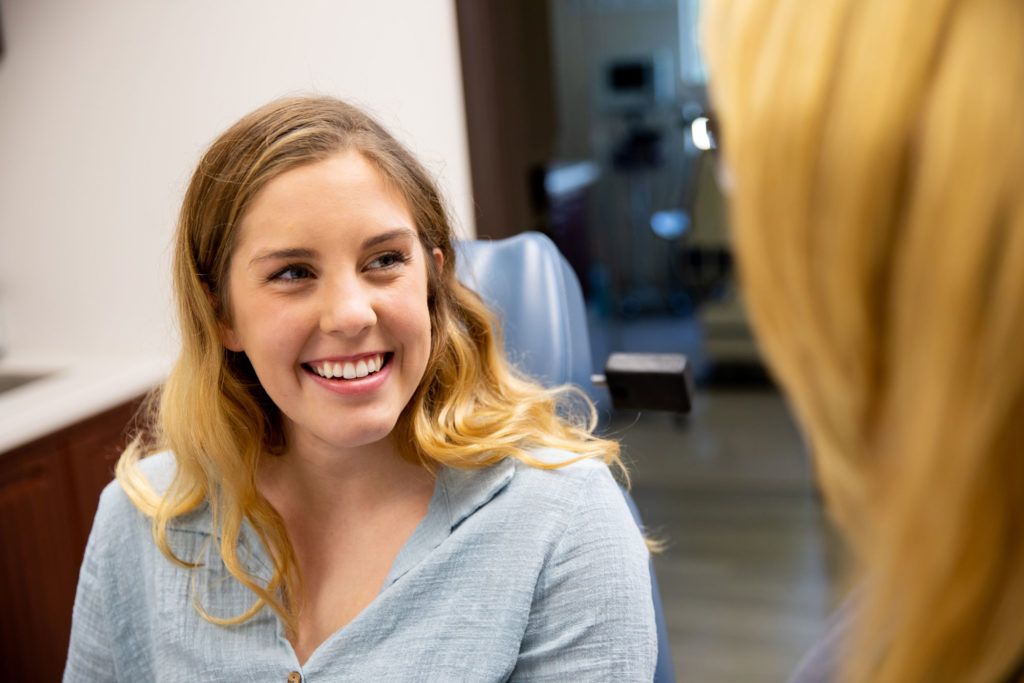AFTER YOUR TREATMENT - DANA POINT, CA
Let the Healing Begin
Good Habits And Diet Are Key
After your oral surgery has been completed at our Dana Point, CA office, it’s important to remember that you still need adequate time to heal. During your recovery, follow all of your post-surgical instructions exactly as they’re given to you. This will bolster your oral health, shorten your healing time, and decrease your chances of developing any complications.
Dr. Eric Baker and Dr. Tim Betita also partner with a nutritionist, who can offer personalized post-surgical diet recommendations to you. This enables you to have foods that are most conducive to healing delivered right to your door. Request more information and discover how good nutrition can help you get better after oral surgery!
Promote Healing After Oral Surgery
- Give it time
- Keep a healthy diet
- Follow all post-surgical instructions

Care After Dental Implants
Swelling is a normal occurrence after surgery. To minimize swelling, apply an icepack or towel filled with ice on the cheek in the area of surgery. Apply the ice off and on every 20 minutes continuously, as much as possible, for the first day until you go to bed.
Drink plenty of fluids. Avoid hot liquids or food. Soft food and liquids should be eaten on the day of surgery. Return to a normal diet, with the exception of hard crunchy food, as soon as possible unless otherwise directed.
Care After Exposure and Bonding
Mouth cleanliness is essential to good healing. Clean your mouth thoroughly after each meal beginning the day after surgery. Brush your teeth as best you can. Rinse with warm salt water (1/2 teaspoon of salt in a cup of warm water) six times a day. Continue this procedure until healing is complete.
REMEMBER: A clean wound heals better and faster.

- Hannah - Jaw Surgery Patient
Follow-Up Care Is Crucial To Regaining Your Oral Health
Dr. Baker and Dr. Betita don’t consider their job done after your oral surgery has been completed. Many procedures such as dental implants and oral pathology treatments call for follow-up care. In addition, some complex procedures cannot be accomplished in a single visit and require additional work during subsequent appointments. Be assured our oral surgeons will complete your oral surgery in as few visits as possible, with your health and safety always top priority. We’re here to verify your procedure was successful, to continue your care when necessary, and to check up on your progress to confirm that you’re healing properly.
Care After Teeth Extractions
The removal of impacted teeth is a serious surgical procedure. Post-operative care is very important. Unnecessary pain and the complications of infection and swelling can be minimized if the instructions are followed carefully.
•The gauze pad placed over the surgical area should be kept in place for a half hour. After this time, the gauze pad should be removed and discarded.
•Vigorous mouth rinsing or touching the wound area following surgery should be avoided. This may initiate bleeding by causing the blood clot that has formed to become dislodged.
•Take the prescribed pain medications as soon as you begin to feel discomfort. This will usually coincide with the local anesthetic becoming diminished.
•Restrict your activities the day of surgery and resume normal activity when you feel comfortable.
•Place ice packs to the sides of your face where surgery was performed. Refer to the section on swelling for explanation.
• If numbness of the lip, chin, or tongue occurs there is no cause for alarm. As stated before surgery, this is usually temporary in nature. You should be aware that if your lip or tongue is numb, you could bite it and not feel the sensation.
• Slight elevation of temperature immediately following surgery is not uncommon. If the temperature persists, notify the office. Tylenol or ibuprofen should be taken to reduce the fever.
• You should be careful going from the lying down position to standing. You were not able to eat or drink prior to surgery. It was also difficult to take fluids. Taking pain medications can make you dizzy. You could get light headed when you stand up suddenly. Before standing up, you should sit for one minute then get up.
• Occasionally, patients may feel hard projections in the mouth with their tongue. They are not roots, they are the bony walls which supported the tooth. These projections usually smooth out spontaneously.
• If the corners of your mouth are stretched, they may dry out and crack. Your lips should be kept moist with an ointment such as vaseline.
• Sore throats and pain when swallowing are not uncommon. The muscles get swollen. The normal act of swallowing can then become painful. This will subside in 2-3 days.
• Stiffness (trimus) of the jaw muscles may cause difficulty in opening your mouth for a few days following surgery. This is a normal post-operative event which will resolve in time.
Sutures are placed the area of surgery to minimize post-operative bleeding and to help healing. Sometimes they become dislodged, this is no cause for alarm. Just remove the suture form your mouth and discard it. The sutures will either be removed or dissolve approximately one week after surgery. The removal of sutures requires no anesthesia or needles. It takes only a minute or so, and there is no discomfort associated with this procedure. So it’s really nothing to worry about.
The pain and swelling should subside more and more each day following surgery. If your post-operative pain or swelling worsens or unusual symptoms occur call our office for instructions.
There will be a cavity where the tooth was removed. The cavity will gradually heal over the next month fill in with the new tissue. In the meantime, the area should be kept clean, especially after meals, with salt water rinses or a toothbrush.
Your case is individual, no two mouths are alike. Do not accept well-intended advice from friends. Discuss your problem with the persons best able to effectively help you: Dr. Baker and Dr. Betita or your family dentist.
Brushing your teeth is okay – just be gentle at the surgical sites.
A dry socket is when the blood clot gets dislodged prematurely from the tooth socket. Symptoms of pain at the surgical site and even pain to the ear may occur 2-3 days following surgery. Call our office if this occurs.
Increased activity may cause throbbing, swelling, and bleeding. We recommend no vigorous exercising for 1 week after surgery.



